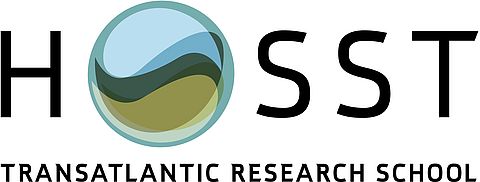The annual summer schools (2 weeks) will be attended by all TOSST and HOSST PhD trainees and taught by both transatlantic partners, based on their specific expertise. The location will rotate annually from Halifax to Kiel to Cape Verde. The transatlantic summer schools will provide a major opportunity for personal networking, cross-disciplinary interaction, and the development of complementary skills and experience. Participation will be mandatory and will include presentation of results in a format accessible to all disciplines
2018 - Cape Verde Joint Summer School – "Seafloor structures and life on Cape Verde"
On Sao Vincente, Cap Verde (Central Atlantic) May 27 - June 8, 2018
Agenda 2018
The focus will be on seafloor structures and life on Cape Verde. We will emphasize the importance of geological structures and processes for Cape Verdeans, linking the natural sciences to their lives. We will study how the geology and its interaction with the air and sea impacted life, the environment, and the homes. The heavily exploited marine ecosystems of Northern Europe and Eastern Canada, and their historical and present-day management regimes, will be contrasted with the present situation for Northwest African ecosystems, which have become the focus of a major, international fishery.
The school will also be open to top selected students and researchers from Cape Verde.
2017 - Kiel HOSST Summer School – “Multi-use conflicts in an industrialized coastal zone”
In Kiel (Germany) June 6 - 16, 2017
Agenda
The Summer School will focus on how ocean system science and technology can provide a firm foundation for reconciling conflicting needs for the sustainable use and protection of coastal areas. Participants of the summer school will include both Kiel- and Halifax-based PhD-Candidates.
The Summer School will combine lectures by scientists from GEOMAR, Kiel University, and regional Ministeries and NGO’s, with on-site visits, demonstrations of technical equipment used for ocean sampling and for modern analytics, as well as sampling from the intertidal and ocean environments.
The focus will be on nurturing a trans-disciplinary understanding of the challenges and possible solutions for sustainable use and protection of our oceans. The knowledge gained during the Summer School will be pulled together in group work, in which the students will be asked to generate management recommendations for a highly impacted coastal region they are familiar with in the North Atlantic. Their short written proposal will be presented orally to a panel of experts, giving them direct feedback on their performance and ideas.
2016 - Halifax TOSST Summer School – “Ocean Technologies and Observations"
In Halifax (Canada) September 26 - October 7, 2016
Agenda 2016
The focus will be on ocean resource extraction and ocean observation technologies, and the utilization of marine robotics, autonomous vehicle technology and advanced chemical, optical and acoustic sensors for ocean measurement. The course will include both lectures and demonstrations from researchers and ocean industry representatives (e.g. representatives of Canadian companies involved in deep water oil/gas development, shipbuilding, offshore mining and ocean technology). The Halifax Marine Research Institute will arrange for students to visit selected ocean technology companies during the course in order to learn first-hand about the process of innovation, product development and marketing of ocean technologies from company representatives.
2015 - Cape Verde Joint Summer School – “The Seafloor and Marine Ecosystem Structures of Cape Verde - Building Capacity for Science-based Management”
On Cap Verde (Central Atlantic) May 18 - 29, 2015
Agenda 2015
The focus will be on ocean biodiversity, including the impacts and management of human activities. The heavily exploited marine ecosystems of Northern Europe and Eastern Canada, and their historical and present-day management regimes, will be contrasted with the present situation for Northwest African ecosystems, which have become the focus of a major, international fishery. We will explore the availability of relevant scientific knowledge to assess the sensitivity and propose management regimes for key deep-sea ecosystems, such as continental margins, hydrothermal vents, cold seeps and seamounts, most of which lie in international waters. The school will also be open to top selected students and researchers from Cape Verde and other West African nations.
2014 - Kiel HOSST Summer School – “Ocean Seafloor Structures and Dynamics”
In Kiel (Germany) June 10 - 20, 2014
The focus will be on the processes forming and modifying seafloor structures, the time-scales over which such processes act, and variations in their intensity in time and space. The importance of seafloor structures for marine environmental protection and their potential for a range of non-biological resources will be assessed. The school program will be based on practical exercises and real-life examples.
Agenda
2013 - Halifax TOSST Summer School – “Ocean Technologies and Observations"
In Halifax (Canada) October 1 - 11, 2013
The focus will be on ocean resource extraction and ocean observation technologies, and the utilization of marine robotics, autonomous vehicle technology and advanced chemical, optical and acoustic sensors for ocean measurement. The course will include both lectures and demonstrations from researchers and ocean industry representatives (e.g. representatives of Canadian companies involved in deep water oil/gas development, shipbuilding, offshore mining and ocean technology). The Halifax Marine Research Institute will arrange for students to visit selected ocean technology companies during the course in order to learn first-hand about the process of innovation, product development and marketing of ocean technologies from company representatives.
Agenda 2013;



